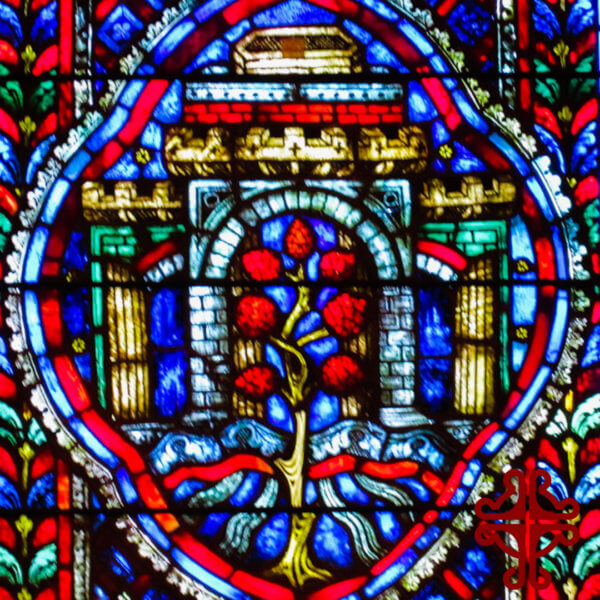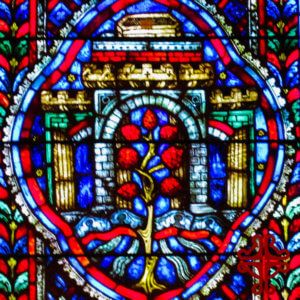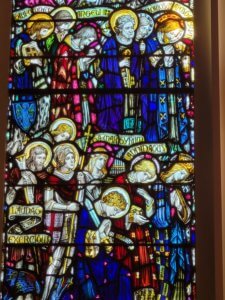
Knowing Jesus

15 “I am the true vine, and my Father is the vinegrower. 2 He removes every branch in me that bears no fruit. Every branch that bears fruit he prunes[a] to make it bear more fruit. 3 You have already been cleansed[b] by the word that I have spoken to you.4 Abide in me as I abide in you. Just as the branch cannot bear fruit by itself unless it abides in the vine, neither can you unless you abide in me. 5 I am the vine; you are the branches. Those who abide in me and I in them bear much fruit, because apart from me you can do nothing. 6 Whoever does not abide in me is thrown away like a branch and withers; such branches are gathered, thrown into the fire, and burned. 7 If you abide in me and my words abide in you, ask for whatever you wish, and it will be done for you.8 My Father is glorified by this, that you bear much fruit and become[c] my disciples.’
— John 15:1-8
From the Collect for today:
Grant us so perfectly to know your Son Jesus Christ to be the way, the truth, and the life, that we may steadfastly follow his steps in the way that leads to eternal life.
For most of the year, we get to know Jesus through the gospels of Matthew, Mark, and Luke. We follow their chronological accounts of Jesus’ life and ministry: his parables, his healings, his relationships. In the Easter Season, most of our Sunday gospel readings are from John and drawn from the time before his Passion. We get to know Jesus in a different way, through different stories, including long theological conversations with women.
John’s gospel–more than any other–is about who Jesus is. The stories there serve the gospel’s particular purpose, which the author stated clearly at the end. It was “written so that you may believe that Jesus is the Christ, the Son of God, and believing you may have life in his name.”
The gospel of John was written to tell the world that Jesus was and is God incarnate.
As a result, uniquely in John, Jesus talks about himself in the first person.
Over and over Jesus says “I am”. In Greek, “I am” is ἐγώ εἰμι (ego emi). Those are the very words that God used to describe himself to Moses in Exodus 3. Any faithful Jew would know that.
Jesus’ Divinity
 The “I am” statements fall into two groups. In one group, Jesus declares his divinity.
The “I am” statements fall into two groups. In one group, Jesus declares his divinity.
The first time he does is in chapter 4, in his long conversation with the Samaritan woman at the well. When the woman says she knows that the Messiah is coming, Jesus replies “I am he, the one who is speaking to you.”
In chapter 8 he said to the Pharisees, “When you have lifted up the Son of Man then you will know that I am he”.
A few verses later, in the Temple, Jesus boldly declared to the Jewish authorities, “Very truly before Abraham was I am”.
Finally and climactically, when Judas and the soldiers said they had come to arrest Jesus of Nazareth, Jesus said “I am he”.
“I am he” seems so simple and reasonable that present-day readers would skim over it. But in Jesus’ time, the reference to Exodus 3 was unmistakable. The words were powerful–and heretical to Jewish authorities. They were a violation of the First Commandment: “Thou shalt have no other gods before me.”
Jesus’ Purpose
In John’s other group of “I am” sayings Jesus uses metaphors to describe the meaning of his presence, his holy purpose in the world.
“I am the bread of life.”
“I am the light of the world.”
“I am the gate.”
“I am the good shepherd”.
“I am the way, the truth, and the life”.
“I am the true vine and the Father is the vine grower.”
Last of all, on the night before he died Jesus said to the disciples: “I am the vine, you are the branches.”
 “I am the vine, you are the branches”. New Testament scholar Professor Karoline Lewis noted that this is the only time that an “I am” statement continues with “you are”.
“I am the vine, you are the branches”. New Testament scholar Professor Karoline Lewis noted that this is the only time that an “I am” statement continues with “you are”.
“I am the vine, you are the branches.” Here Jesus tells us both who he is and who we are. With these parting words, Jesus gave the disciples a new way of understanding their identity and purpose, their new way of being in the world—and ours. It was epoch making for them–and for us.
The metaphor says that Jesus is one with them and one with us in our very being. The vine and the branches are inseparable, completely interdependent. As Jesus’ followers we are one in and with Jesus: inseparable, completely interdependent. The branches cannot live apart from the vine; the vine cannot bear fruit without the branches.
By extension, as disciples we are radically united to one another through our shared life-giving attachment to Jesus. In every Eucharist we practice the corporeal truth that we are one body in Christ, as we share the body and blood of our Savior.
Professor Lewis noted: “Jesus’ statement is not ‘You have been’ or ‘You will be,’ but ‘You are the branches.’ Jesus is the vine, and I am a branch. And so are you, and you, and you, and you, and you.
What difference does that make—to you? To me?
Troubled Times
“It’s no secret that we live in troubled times….what once seemed to make sense, now seems inadequate; what we thought we could count on now uncertain.” That is a quote from James Hollis’ preface to his 2020 book Living Between Worlds: Finding Personal Resilience in Changing Times.
Bob Dylan’s 1960s song “The Times they are a Changin’ was full of hope, but not all changing times are.
In contrast, hear the first verse of William Butler Yeats’ masterpiece The Second Coming, written in1919, the wake of World War I. It is hauntingly prophetic of our own time.
Turning and turning in the widening gyre
The falcon cannot hear the falconer;
Things fall apart; the centre cannot hold;
Mere anarchy is loosed upon the world,
The blood-dimmed tide is loosed, and everywhere
The ceremony of innocence is drowned;
The best lack all conviction, while the worst
Are full of passionate intensity.
 Today the world stands at so many crossroads. There are real threats to the social, political, climatological, economic order that people my age thought we could always count on; even the post-war spread of democracy that the US led throughout the world is in peril.
Today the world stands at so many crossroads. There are real threats to the social, political, climatological, economic order that people my age thought we could always count on; even the post-war spread of democracy that the US led throughout the world is in peril.
All is not lost. For a dose of hope, particularly about the environment, check out the inspiring stories PBS’s A Brief History of the Future.
But where do you and I draw individually the strength to play our part–however modest–to meet these challenges?
For encouragement, I look to the long history of God’s eternal presence. Take the legacy of St. Benedict. When he was born over 1500 years ago, the Roman Empire had collapsed. That ended a centuries-long period of political, social and economic stability. Benedict left the security of his noble home in Rome to seek God, first as a hermit, then as the founder of a dozen monasteries before his death in 547. Since then, many, many kingdoms, principalities, duchies, and empires have risen and fallen. Benedict’s holy work has endured intact: from his time on through today, women and men live in monasteries and act in the world following the Benedictine Rule of prayer and service.
In uncertain times, we need to ground ourselves in transcendent truths and values, to remind ourselves who we are and whose we are. There is an ancient spiritual practice I use when I get stuck in fear or negative thinking, when worry wakes me up at 3 am. I shift my mind to a comforting prayer or piece of scripture that I’ve memorized and I repeat it to bring God’s peace back to center of my being.
Two favorites are Psalm 23 (KJV), and this from Philippians 4:
Do not worry about anything, but in everything by prayer and supplication with thanksgiving let your requests be made known to God. And the peace of God, which surpasses all understanding, will guard your hearts and your minds in Christ Jesus.
I’m adding two to this “library” of comfortable words from today’s gospel. They’re so short that they also work as a meditation mantra.
“I am the vine, you are the branches.”
AND
“Abide in me as I abide in you.”
Let it be so.
